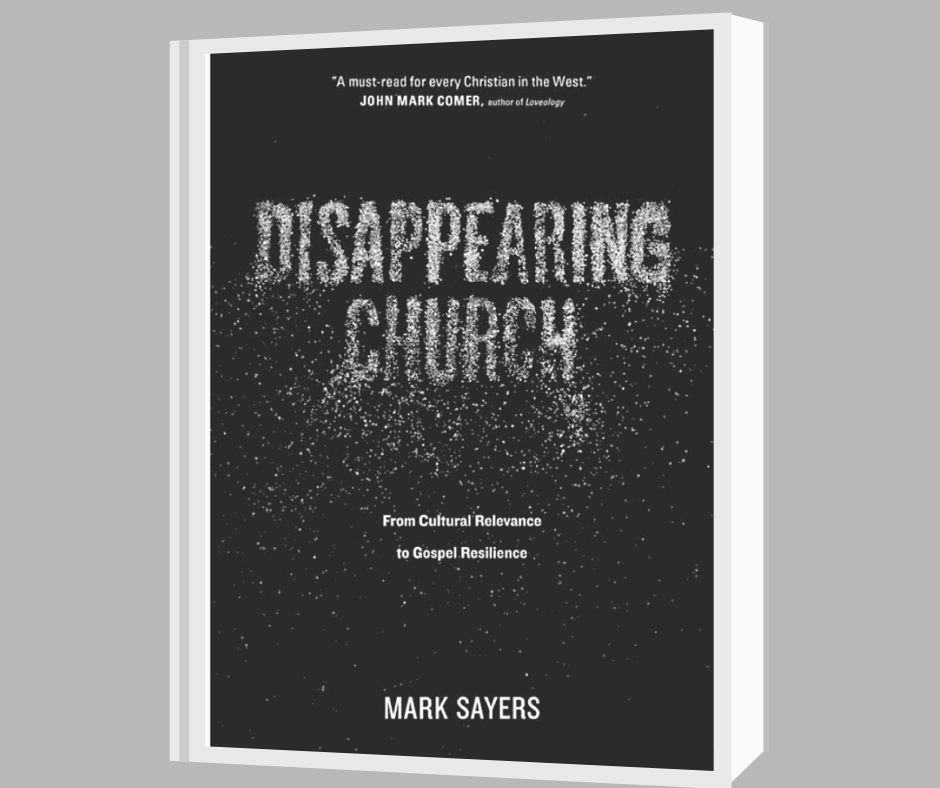Book Reviews
The Disappearing Church: From Cultural Relevance to Gospel Resilience, by Mark Sayers | Review by Rosa Byler

The Disappearing Church uses storm imagery—darkening skies, increasing clouds, and lowering temperatures—to introduce cultural climate changes that significantly affect the Western church. Australian pastor Mark Sayers identifies the sidelining of the Judeo-Christian worldview; abandonment of faith by numerous believers; the closing of churches as members age and die; and “the disappearance of a mode of church engagement characterized by commitment, resilience, and sacrifice.” (8) A growing segment of our society, however, sees these shifts as harbingers of fine weather—mostly due to the Enlightenment idea that Christianity has been the problem and paganism is the solution, but also to the refurbished heresy of Gnosticism.
Sayers describes post-Christianity as a new “third culture” rather than a return to the pre-Christian mentality. (He explains “first culture” as paganism, with many gods; “second culture” is scriptural, rooted in Judeo-Christian ethics.) Onlookers witness, not chaos and general collapse, but forms of order, community, social justice, good works, and beauty. Thus absence of Christian influence has not led to a hunger for the gospel; instead, post-Christianity aims to experience Christianity’s benefits while denying their power and origin. An illustration of this is the Sunday Assembly in London, a congregation for atheists that gathers to sing together, listen to messages, and present offerings. The group has midweek meetings, children’s clubs, and community good-works projects as well, for those who want “church without belief.” (19-20)
Post-Christianity is also actively evangelizing, preaching the “alternate gospel of self” (Gnosticism) and rapidly becoming the dominant storyline. (The very real danger exists that second-culture missionaries will themselves be “converted” by third-culture zealots.) First-century Gnostics tried to escape the body and the world to find perfection through hidden spiritual knowledge; modern Gnostics want to escape the mundane, pursuing perfect bodies and incredible experiences. Disdaining ordinary “collective responsibility, traditional moral guidance, and binding relationships,” they seek comfort and security in controlled, aesthetically tasteful spaces where there is seemingly no need for God. (92-93) Increased options for personal choice emphasize individual autonomy. Predictably, the family and the church are not the only organizations affected—Sayers describes the frustrations of al Qaeda, for one, with undisciplined and self-centered Western recruits.
Fear of being thought intolerant, judgmental, and outdated led many churches to pursue cultural relevance; yet attempting to portray the gospel as contemporary and comfortable has actually meant greater losses. Two options present themselves: becoming “bitterer, more despondent, more isolated” or “shaping our theology, spirituality, and lifestyle” to better fit our surroundings. Sayers offers what he sees as the only approach resistant to the caustic environment of Western culture: gospel resilience. This involves “creative minorities” of believers, who (instead of seeking to restore popular approval) step back from the culture long enough to identify its false narratives and to evaluate personal errors. Then, with Christ at the center of their efforts, they return to rebuild, “dwelling in Scripture, quietly living out the kingdom…accepting [their] limitations, sacrificing and serving.” (120)
Sayers’ sociological assessment is keenly perceptive, yet compassionate. Pastoral concern is evident in his suggestions for ministry to functional Gnostics, whose public spheres may be aesthetic and self-indulgent but whose private worlds are fragile and filled with anxiety. Insight into our times, from those who have knowledge of them, is always helpful—and churches that have not followed the multitude to be relevant will nonetheless be astonished at how much prevailing philosophies affect them. A valuable and sobering read.